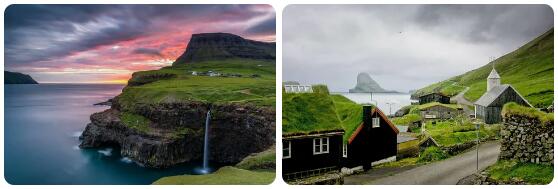Business
The economy of the Faroe Islands is mainly based on the fishing and fish processing industry, which together contribute almost the entire value of exports. Fishing is mainly conducted along the coasts as well as at Greenland and Iceland. Catches increased continuously during the 1960s and 1970s, but stagnated during the first years of the 1980s. Due to large investments in i.e. fishing vessels began to catch catches again during the late 1990s, and in 2003 the largest annual catch (621,000 tonnes) was reached to date; In 2012, the annual catch was 360,500 tonnes. In addition to sea fishing, there is also a rapidly growing fish farming of mainly salmon.
In the early 1990s, the Faroe Islands were hit hard by the recession, with a rapidly rising unemployment rate. Many moved to the northern Jutland fishing towns. The Faroe Islands were helped to clean up the economy by the Danish state, on condition that fiscal policy went through a major decontamination and came under Danish supervision. After 1995, the economic downturn has reversed, and despite the financial scandal with the country’s largest bank, Føroya Banki, where Den Danske Bank sold the majority of its ownership in the then-hit bank to the government, the economy has developed positively during most of the 2000s. Despite this, many economists have warned that the Faroese economy is too dependent on the fish industry and world market prices for fish.
Agriculture with livestock management, which used to be an important industry, now employs less than 2% of the professionals. However, occupational combinations (eg agriculture and fishing) are common. About 6% of the area is cultivated, of which 90% is used for the cultivation of fodder plants. The rest of the land is used as pasture. The most important agricultural products in the Faroe Islands are sheep meat, milk, vegetables and potatoes. Production is not enough to meet the need for food, and food imports are significant.
In addition to fish processing, the Faroe Islands industry includes other food industries, but also the engineering industry. machine and ship manufacturing and textile industry. Furthermore, coal is mined to a small extent. About 50% of the Faroe Islands’ energy needs are met through their own produced water electricity. In 2001, smaller oil deposits were found on Faroese territory. Since then, several international oil companies have been exploring for more oil, but so far no major discoveries have been made.
Denmark’s accession to international economic associations has not automatically resulted in membership for the Faroe Islands. Most often, the connection has come later, such as GATT (1954 vs. 1950 for Denmark) and EFTA (1967 and 1959, respectively), from which the Faroe Islands formally resigned in 1973. When Denmark became a member of the EC in 1973, the Faroe Islands were not affiliated. Since 1974, however, the Faroe Islands have a special agreement with the EU, which in effect acts as a free trade agreement as regards exports of fish and fish products. This agreement was extended in 2005. In addition, the Faroe Islands receive subsidies and transfers from Denmark annually, which together make up 12% of the Faroe Islands’ state budget.



